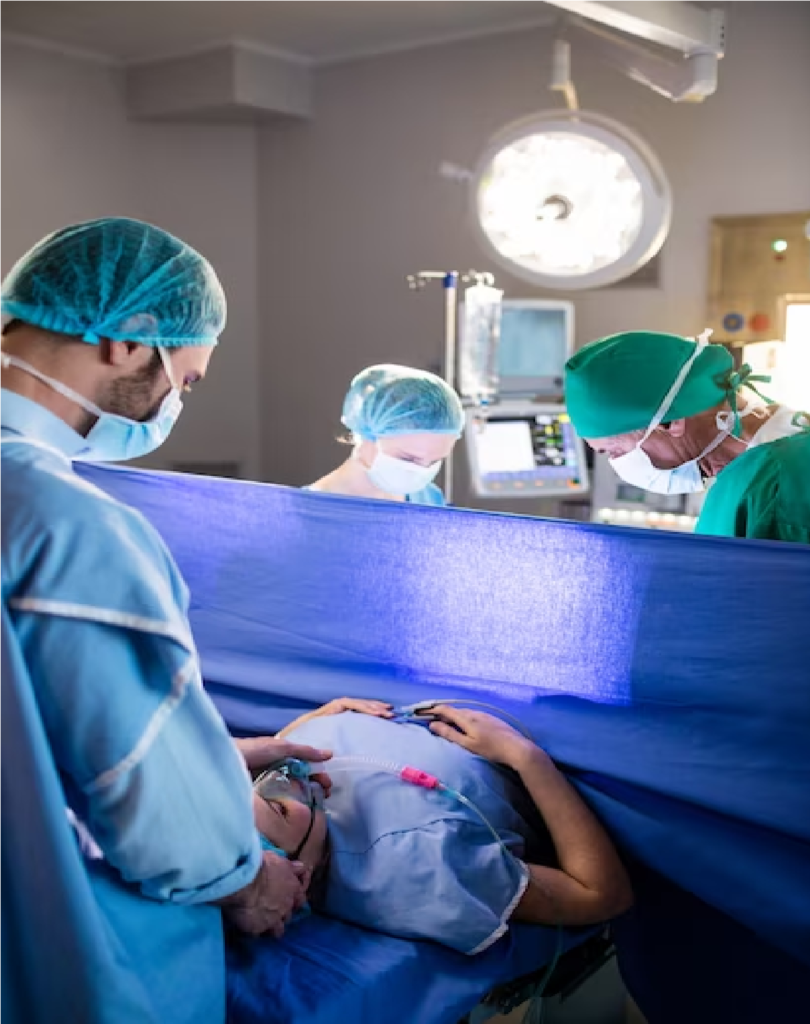


Worried about getting a C-section? Here’s what to expect before, during, and after the caesarean section delivery.
Pregnancy and childbirth are turning points for every woman. During this nine-month journey, numerous physical, emotional, and hormonal changes occur that affect the normal daily routine of a woman. While most deliveries are vaginal, there are many cases where a C-section is planned or unexpected. In this blog we will discuss about caesarean section delivery and how to recover from it.

A C-section delivery, also known as a caesarean delivery, is done through an incision made in the mother’s abdomen and uterus. Caesarean delivery is only done by doctors when it is found to be a right and safe decision for both the mother and the baby.
Doctors usually suggest a C-section delivery option to mothers who are willing to do it and also because of some health concerns for the baby and the mother. The incision made in the caesarean section delivery can be either horizontal or vertical.
If you are scheduled for a C-section or are considering the possibility, it’s important to be prepared and understand what to expect before, during, and after the procedure. In this article, we will discuss the preparation for a C-section, what happens during the surgery, and how to recover afterwards.
Preparation is key when it comes to a C-section. By understanding the process and making the necessary arrangements, you can feel more confident and empowered. Following are some important steps you should follow before going for a C-section delivery.
Take the time to learn about C-sections. Understand the reasons why they may be recommended, such as complications during pregnancy, the breech position of the baby, or maternal health conditions. Talk to your healthcare provider, ask questions, and discuss any concerns you may have.

Open and honest communication with your healthcare provider is crucial. Discuss your birth plan, understand the reasons behind the C-section recommendation, and clarify any doubts. This will help you feel more involved in the decision-making process.
Seek emotional support from your partner, family, or friends. Share your thoughts and feelings about the upcoming C-section. Having a strong support system can alleviate anxiety and provide reassurance during this time.
Pack your hospital bag in advance with essentials for both you and your baby. Remember to include comfortable clothing, toiletries, nursing bras, and items for your newborn. Familiarise yourself with the hospital’s policies and procedures for C-sections.
Knowing what to expect during the C-section can help reduce anxiety and enable you to be mentally prepared for the surgery. Here’s what typically happens during a C-section:
Before the surgery, you will receive anaesthesia to numb the lower part of your body. This can be in the form of a spinal block or an epidural. The anaesthesia will keep you comfortable during the procedure while allowing you to remain awake and aware.
Once the anaesthesia takes effect, the surgeon will make an incision in your abdomen and uterus. The incision is usually horizontal, just above the pubic hairline. Through this incision, the baby will be safely delivered. The medical team will be there to guide and support you throughout the process.
Throughout the C-section, you will be closely monitored by healthcare professionals. They will keep a check on your vital signs and ensure that everything is progressing smoothly. The medical team will explain each step and provide updates on your baby’s well-being.
In many cases, a birth partner or support person can be present in the operating room during the caesarean section delivery. This allows them to provide emotional support, witness the birth of the baby, and share in the joyous moment.
Recovering from a caesarean section delivery requires time and proper care. Here are some important aspects to consider during the recovery process:
Following the surgery, you will spend a few days in the hospital for monitoring and recovery. The medical staff will provide pain management options to keep you comfortable. Take advantage of their expertise and communicate any discomfort you may be experiencing.

Initially, you will need to take it easy and allow your body to heal. Engage in gentle movements and activities as advised by your healthcare provider. Gradually increase your activity level as you regain strength.
Proper care of the incision is essential to prevent infection and promote healing. Keep the incision clean and dry. Follow your healthcare provider’s instructions regarding dressing changes and bathing. Avoid lifting heavy objects and engaging in strenuous activities that may strain the incision area.
The postpartum period can be emotionally challenging, regardless of the delivery method. Hormonal changes, physical discomfort, and adjusting to the demands of parenthood can take a toll. Seek emotional support from your partner, family, or friends.
Attend all postpartum check-ups with your healthcare provider. These visits are crucial for monitoring your recovery, addressing any concerns, and ensuring that you and your baby are healthy.
Pregnancy is a beautiful journey that gives a bundle of joy and excitement to the mother and the whole family. Vaginal delivery is mostly advisable and preferred by mothers, but in some cases, C-section is the safest option for both the mother and the baby.
If you have been advised or are choosing to have a C-section, you must consult your healthcare provider and ask them about any doubts, questions, risks and complications that you may have. As every pregnancy and delivery experience is different, therefore, try to take ample rest after the surgical procedure. By educating yourself, communicating with your healthcare provider, and taking care of yourself during the recovery period, you can have a positive and healthy caesarean section delivery. Embrace the journey of becoming a parent and cherish the precious moments with your newborn.